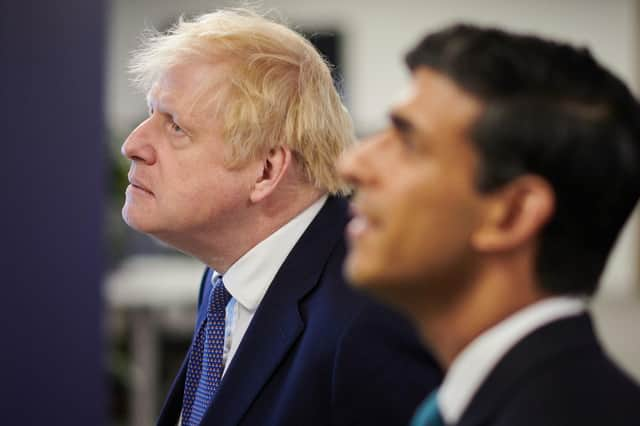Owen Polley: Seven years after Brexit, NI is the region Britain left behind


You might think that the time seems to have flashed past, but the Brexit vote can also feel like several political lifetimes ago. That could be because, for most of that period, Northern Ireland was in the unenviable position of being at the centre of apparently endless negotiations between the UK and the EU. The dispute about our constitutional position was exploited ruthlessly, as Brussels sought to contain Britain’s assertions of sovereignty and retain some control over its market.
According to our own government, and the EU, that saga is finally over. The Northern Ireland Protocol has been made workable, they say, by the Windsor Framework, which restored free trade from the mainland, while retaining our ‘privileged access’ to the European market. That is the official version, but we continue to discover that it does not reflect reality.
Advertisement
Hide AdAdvertisement
Hide AdA couple of weeks ago, for example, DEFRA published onerous requirements for labelling that will apply, initially, only to goods arriving in Northern Ireland from Great Britain.
The government promised a UK-wide regime, but that is not due to come into force until 2024. By then the Conservatives are unlikely even to be in power. And there will in any case be a consultation, which is a tactic often used to indefinitely delay a potentially unpopular measure.
The EU, meanwhile, has just published complicated legislation that sets customs regulations for parcels moving between Great Britain and Northern Ireland. Brussels now determines the rules for people or companies sending packages to this part of the UK, despite there apparently being ‘no sense of a border in the Irish Sea’, according to Rishi Sunak.
From October, almost all materials for manufacturing will also have to travel through a ‘red lane’, that requires full customs formalities, checks and paperwork. A logistics professional tells me that Northern Irish supply chains are already diverting away from Great Britain as a result, which is going to make some companies unviable.
Advertisement
Hide AdAdvertisement
Hide AdHe says that businesses are reluctant to speak out about these issues, because they are considered politically charged. But many of them are getting increasingly frustrated and worried, as they struggle to extract the relevant information from government departments.
This background makes it difficult to think about the anniversary of the Brexit referendum with equanimity. It’s now a common idea that the result made all of this inevitable, or that it was justified because many unionists and others had the audacity to want to leave the EU.
It’s worth remembering, though, that if every Leave voter in Northern Ireland had voted Remain, it would not have affected the nation’s overall decision. That’s not to say, as received wisdom has it, that Brexit was fuelled by ‘English nationalism’.
When people went to the polls that day, they voted to restore power to the United Kingdom, not for an independent England. That was hardly unreasonable or surprising.
Advertisement
Hide AdAdvertisement
Hide AdFor decades, it was obvious that Britain did not share Brussels’ goal of creating a federal EU state. That was why David Cameron asked the European Commission to allow us to opt out of ‘ever closer union’, before the referendum.
Voters may not have taken Northern Ireland’s trade arrangements fully into account, in strongly Leave areas like the north of England. But people here rarely make their political decisions based on the problems faced by Middlesborough or Great Yarmouth.
That’s not the same as ‘nationalism’, which is just another jibe aimed at belittling people who voted Leave and implying that they had dark motives.
In contrast, the allegation that Boris Johnson and his government capitulated on Northern Ireland to secure a Brexit deal with the EU is completely fair. We were the region of the UK left behind, as the rest of the country exited, and that treachery cannot be explained away or forgotten, as the former prime minister’s sympathisers would like to believe.
Advertisement
Hide AdAdvertisement
Hide AdEqually though, the Northern Ireland Protocol was signed at the end of a protracted post-Brexit political civil war. During that spell, the government’s opponents, and even some of its own backbenchers, used every tactic they could think of to try to prevent the referendum result from being applied.
That included invoking our constitutional issues in an irresponsible and partial way, in league with Dublin and Brussels. Many of the most hardcore remainers used highly insulting and infantile language to describe Brexit supporters, Northern Irish unionists and anyone else who didn’t fit their preconceived idea of enlightened, socially aware voters.
None of this proved remotely helpful. It didn’t help bring about a moderate, reasonable solution to the sea border problem, or secure a constructive long-term relationship with the EU.
All it achieved was to polarise voters and politicians, so that soon both sides were talking in harder, less compromising language and forgetting that Brexit meant different things to different people. This uncivil tone, and the implication that every political question is a moral choice between good and evil, still colours British politics today.
Advertisement
Hide AdAdvertisement
Hide AdOf course, in Northern Ireland, the fractious atmosphere at Westminster over the past seven years, and the UK’s resultant failure to negotiate reasonable trade arrangements, are still having serious repercussions. Irrespective of what Sinn Fein tried to imply, it was those factors that ultimately caused the collapse of the executive and the assembly at Stormont.